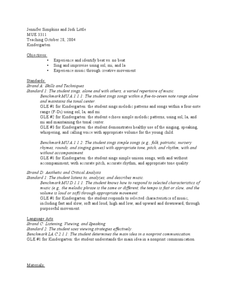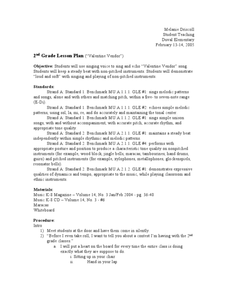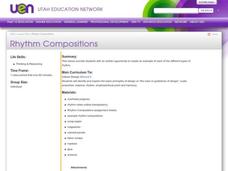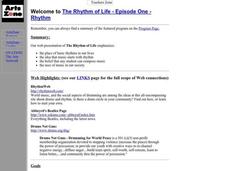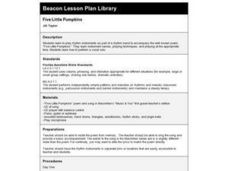Prestwick House
"Because I could not stop for Death" -- Visualizing Meaning and Tone
Emily Dickinson's "Because I could not stop for Death" provides high schoolers with an opportunity to practice their critical thinking skills. They examine the images, diction, rhythm, and rhyme scheme the poet uses and consider how...
Curated OER
3-5: Rhythm Beginnings
Students explore tempo. In this rhythm beginnings lesson, students differentiate between steady and unsteady beats. Students clap a variety of tempo and then move to the tempo of a song.
Curated OER
Native American Music and Dance Activity
Young scholars demonstrate keeping steady beat through practice exercises and stepping to the beat using instruments such as conga drums, tambourines and rhythm sticks.
Curated OER
VH1 Ultimate Albums Bob Marley - Legend Episode #3
Students compare Reggae to other musical genres and identify rhythms. They study the history and musical significance of Reggae as a musical genre.
Curated OER
African Composition
In this music worksheet, students compose their own African music. First, they decide which instruments they are going to use. Then they create a pattern and make a variation to it. Finally, students add a timekeeper and different layers...
Curated OER
African Music
In this African music worksheet, students read about how family life, community music, and rhythms are part of the culture and music of Africa.
Curated OER
Singing: "I Mailed Myself to You"
Keeping a steady beat, singing soft, loud, and in unison - sounds like music class to me! First graders practice these skills while listening to the song, "I Mailed Myself to You" for Valentine's Day. This is a simple and age appropriate...
Curated OER
Singing: Mi, So, La
Little ones learn the tones mi, so, and la by singing an answer to a sung question. They play a name game to identify beat, then discuss songs with no beat. If there is time during this musical instruction lesson, they dance about the...
Curated OER
Learning Refrain and Verse
Instruct your young musicians on the terms verse and refrain. They listen to two songs, and point out the verse and refrain as they occur. Students then play drums when they hear the verse and the refrain. Note: Song lyrics, sheet music,...
Curated OER
Grade 2: Music/Valentine's Day
Play and sing a Valentine's song with your second graders. They'll follow along allow as you demonstrate how to sing and keep a steady beat on non-pitched percussive instruments. While the music lesson has a Valentine theme, that theme...
Curated OER
Moving Rhythms
Students explore the elements of tempo, beat and rhythm. They create rhythm patterns and an original dance. In groups, students perform their phrases for their peers. As a class, they explore choreographic principles, processes and...
Curated OER
Rhythm Compositions
High schoolers investigate the concepts that focuses upon the musical rhythms. They conduct class discussion and use questions in order to clear up any misconceptions. Students create art compositions that illustrate rhythm and then...
Curated OER
Musical Rhythm Instruments
Learners develop a better understanding of rhythm instruments and their relationship to music. It also provides an understanding of the importance of color and shape in creative expression.
Curated OER
The Rhythm of Life - Episode One - Rhythm
Students investigate the role of music in their lives. They examine rhythm as the building block of music and examine how to appreciate music. They investigate music as a tool in health and healing.
Curated OER
Rhythm
Fifth graders listen to a song from a compact disc called "Talking Spirits" and discuss whether they have ever heard music like that before and who might be playing the instruments and the music. They try to identify the instruments...
Curated OER
Rhythm II
In this music worksheet, students study rhythm and learn that it is made up of beat, tempo and meter. Students look at 4 visual patterns and draw what comes next. These are not as easy as they seem.
Curated OER
Genre Lesson: Poetry
Hook kids into a study on poetry elements by asking them to bring in the lyrics to their favorite song. Discuss the elements in one or two songs (preferably that demonstrate rhyme, figurative language, or a repeating phrase). Groups do...
Curated OER
Reading Basic Music Notes
First graders develop skills in reading music notes. In this reading music activity, 1st graders clap and chant rhythm patterns and learn music vocabulary. Students also match patterns by listening to the teacher perform the pattern.
Curated OER
Jazz and Math: Rhythmic Innovations
Learners compare and contrast the rhythms of marches and jazz. They watch an excerpt about Buddy Bolden from the PBS Ken Burns Jazz documentary, compare/contrast march and jazz rhythms, complete a worksheet, and notate and perform jazz...
Curated OER
FIVE LITTLE PUMPKINS
Middle schoolers explore the rhythm instruments as part of a rhythm band to accompany the well-known poem, "Five Little Pumpkins." They study instrument names, playing techniques, and playing at the appropriate time. They study how to...
Curated OER
VH1 100 Greatest Women of Rock & Roll Lesson 3
Students examine female artists who perform in the genres of rhythm & blues, jazz, soul, and hip-hop/rap. They compose lyrics and melody in one of these genres.
Curated OER
"Let's Write a Song"
Fourth graders analyze, brainstorm and practice playing a melody/pattern with rhythm, tempo, dynamics, and instrumental pieces of many styles. In addition, they create an original piece of music.
Curated OER
I Spy Poetry
Students identify and interpret the rhythm and form of the I Spy poem.
They then integrate art, music, literature, technology, and writing with poetry. Students also write their own poem based on the picture they printed from the I Spy...
Other popular searches
- Rhythm and Blues
- Music Rhythm
- Rhythm in Poetry
- Rhythm Sticks
- Rhythm Instruments
- Poetry Rhythm
- Jazz Rhythms
- Choir Rhythm Games
- Rhythm and Blues Timeline
- Rhythm and Blues Elements
- Rhythm and Blues Lyrics
- Rhythm and Blues Artists









